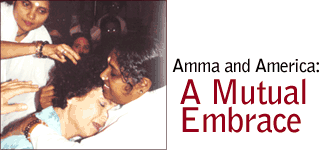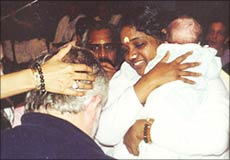The Rediff US Special/Arun Venugopal

Fourteen years ago, Steve Schmidt, a criminal defense attorney in Santa Fe,
New Mexico, received a call from a woman named Kusuma.
She was trying to organize accommodations for Mata Amritanandamayi, a spiritual instructor
whose affectionate and healing embraces had earned her both devotees and critics in India.
At the time, however, few Americans had heard of the guru, known affectionately as Amma or Ammachi.
Schmidt readily made his home and spacious mountainside property available
to Amma and her congregation.
In the late 1960's, Schmidt had been a full-fledged hippie, and over the years had become an ardent practitioner of meditation and Eastern spirituality.
Word spread through the Santa Fe community that a female saint with great powers would be visiting, and before he knew it Schmidt had a house full of seekers.
During the gathering, Amma sipped from a glass of rice water before passing
it on to Schmidt and his wife. The two in turn shared it with another couple, Steve Fleischer and his wife, Marilyn Eto. Within moments, the four began to have a profound, physical reaction to the rice water they had been given.
"It was one of the most powerful experiences I'd ever had. I could barely function," said Schmidt, recalling the moment vividly. He was enjoying a vegetarian lunch in the foyer of Roone Arledge Hall, at Columbia University in New York on Tuesday.
Inside the auditorium, Amma, who is visiting half a dozen American cities,
and her devotees continued a three-day series of darshans and bhajans. His friend and long-time spiritual companion Fleischer, sitting next to him, was quick to dispel any misunderstandings.
"That was all that was in there, rice water," the attorney said laughing.
"It was not a drug-like experience," Schmidt continued. "My mind was
totally clear. I was right in the present. Otherwise, I would've been driven out of
my mind, there were so many people. There were no side effects."
The experience, they explained, was simply the effect some get from coming into close contact with Amma, an experience that few understand but most gladly accept.
Fleischer and Schmidt referred to the phenomenon as "the honeymoon," a transformative process that sets the stage for more serious spiritual engagement. "That's how your faith develops," explained Fleischer of the after-drink effect. "Faith is the lynchpin."
However, Fleischer and other Americans realized faith alone would not make EM>Amma's plans viable. It was crucial to gain non-profit status if the organization were to have any serious impact, particularly in the area of fund-raising.
That same year, Fleischer helped establish the Mata Amritandamayi Center in Castro Valley, California. The setup would be a dramatic change from the earlier method of living from day to day, receiving cash donations then going out and buying provisions.
"Amma was reluctant to do anything formal," noted Fleischer. "It was totally hand-to-mouth because that's what she was used to."
As Amma's reputation spread in the West, the venues grew larger.
 Nonetheless, Fleischer maintained that there were no specific moments when Amma's appeal suddenly attained critical mass. "It's amazingly organic. All of this just happened," he said, adding, "I know that sounds really glib."
Nonetheless, Fleischer maintained that there were no specific moments when Amma's appeal suddenly attained critical mass. "It's amazingly organic. All of this just happened," he said, adding, "I know that sounds really glib."
While the organization has done "a modest amount of publicity," Fleischer noted that Amma tried to avoid projecting an overly ambitious image of herself, as with some earlier gurus who had tried to woo America into a psychedelic state of bliss.
"Mother's very conscious of all of that," said Fleischer. "She's very aware of bogus Indian teachers."
In recent years, members of the press have dubbed her "The Hugging Saint," a
cutesy label that is grudgingly tolerated by followers.
Quite clearly, however, her appeal extends beyond the bear hugs that have been splashed across American newspapers and most recently, on NBC's Today show. "Meditation is good, japa is good, but the key is seva," said Fleischer, echoing Amma's lessons. "Through selfless service you can attain the goal."
And it shows at her events. From the moment you step into an Amma gathering, you can't help but notice the emphasis on charity. On one TV screen, a video details the state-of-the-art medical care patients receive at the Amrita Institute of Medical Science, based in Kerala. The hospital, heavily subsidized by donations from around the world, has managed to serve all economic classes.
Nearby, a multimedia presentation explains relief efforts for victims of the Gujarat earthquake, for which thousands of homes are being built. In all-American style, followers have also conducted garage sales - even combing the streets for discarded furniture - in order to send funds to Gujarat.
Another service involves providing pension for widows and destitute women.
Fortunately for the casual visitor, the attendants at each of these desks refrain from being pushy. There is no effort to proselytize or aggressively court funds.
"Mother doesn't come with her palm out," said Fleischer. "If you give, it's great. But you have to give."
In spite of her growing appeal here, there is no comparing the American crowds with those in India. On any given day, Amma may embrace ten or twenty thousand devotees, many of who are extremely poor or unwell.
In America, the very idea of a living Goddess who heals by touch seems unfathomable.
"I think more people in India have faith," noted Schmidt. "In America, people are more materially advanced and can hold on longer without worrying about their next meal. I would say that most of the Americans who come to Amma have been skeptical at some point in time. It's just sort of our
background. I wasn't skeptical, but my wife was."
As a former professor of comparative religion in Colorado, the woman now known simply as Janani, was herself wary at one time, but lost her doubts when exposed to the charitable works of the organization.
"I look at these works and I realize they're not the works of a megalomaniac," said Janani, who now works as Amma's official photographer and archivist, recording every moment for posterity.
"She could've had a fleet of Rolls Royces. But she doesn't. She lives in one small room."
Schmidt, focusing on the rigor of Amma's many embraces, saw it another way: "If she has any ulterior motives she'd have to be the world's greatest masochist."
Just then, a custodian for the building left the auditorium, brandishing the Hershey's Kiss ( a small milk chocolate) that every devotee receives upon hugging Amma. As he went back to work, it was clear he was satisfied with his darshan.
"I was thinking about something I want," said Hector, a native of the Dominican Republic. "And I feel much better. Stronger. It was beautiful."
Back to top
Tell us what you think of this feature